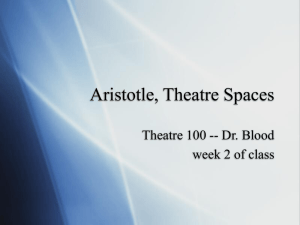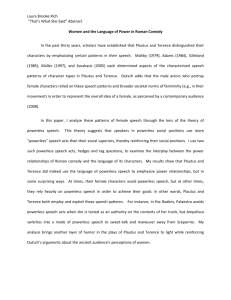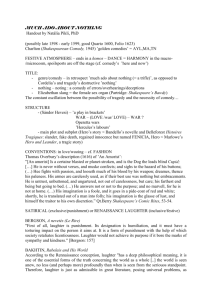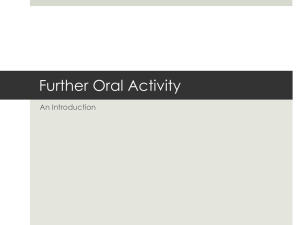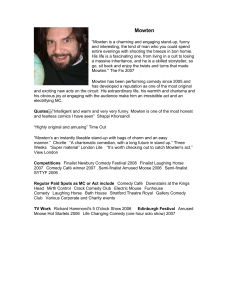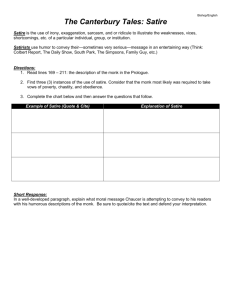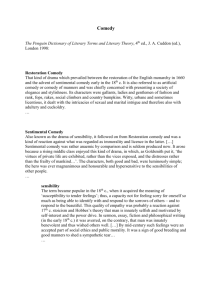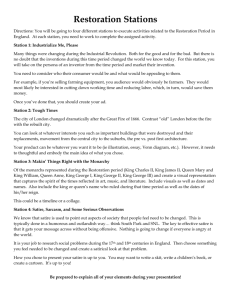study guide
advertisement
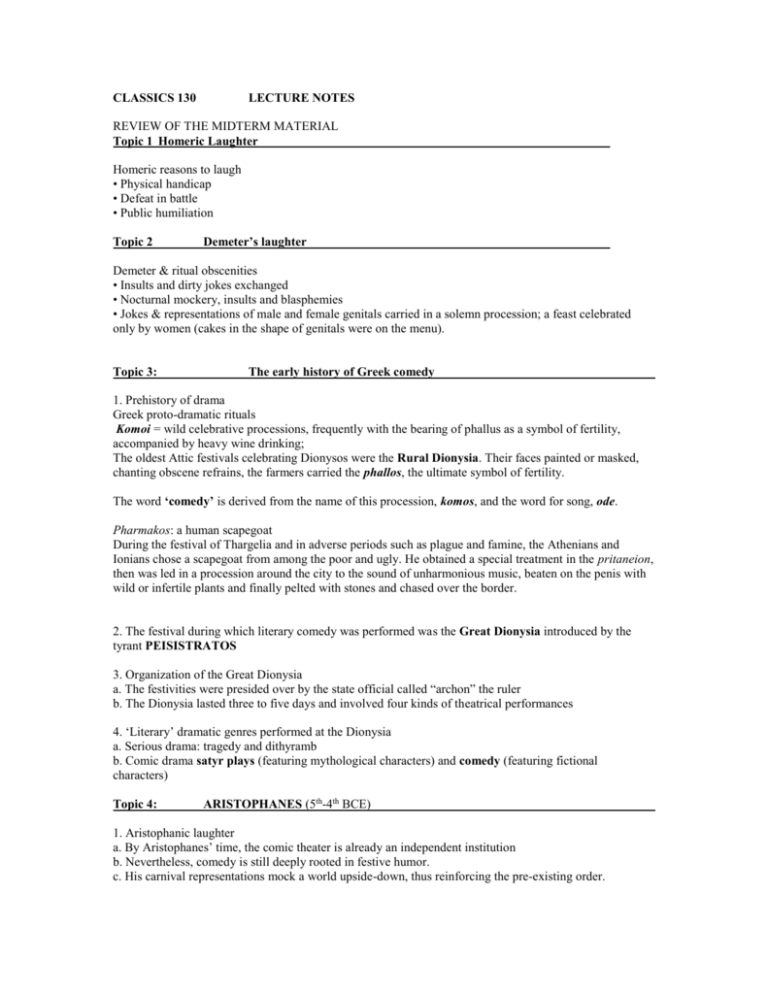
CLASSICS 130 LECTURE NOTES REVIEW OF THE MIDTERM MATERIAL Topic 1 Homeric Laughter Homeric reasons to laugh • Physical handicap • Defeat in battle • Public humiliation Topic 2 Demeter’s laughter Demeter & ritual obscenities • Insults and dirty jokes exchanged • Nocturnal mockery, insults and blasphemies • Jokes & representations of male and female genitals carried in a solemn procession; a feast celebrated only by women (cakes in the shape of genitals were on the menu). Topic 3: The early history of Greek comedy 1. Prehistory of drama Greek proto-dramatic rituals Komoi = wild celebrative processions, frequently with the bearing of phallus as a symbol of fertility, accompanied by heavy wine drinking; The oldest Attic festivals celebrating Dionysos were the Rural Dionysia. Their faces painted or masked, chanting obscene refrains, the farmers carried the phallos, the ultimate symbol of fertility. The word ‘comedy’ is derived from the name of this procession, komos, and the word for song, ode. Pharmakos: a human scapegoat During the festival of Thargelia and in adverse periods such as plague and famine, the Athenians and Ionians chose a scapegoat from among the poor and ugly. He obtained a special treatment in the pritaneion, then was led in a procession around the city to the sound of unharmonious music, beaten on the penis with wild or infertile plants and finally pelted with stones and chased over the border. 2. The festival during which literary comedy was performed was the Great Dionysia introduced by the tyrant PEISISTRATOS 3. Organization of the Great Dionysia a. The festivities were presided over by the state official called “archon” the ruler b. The Dionysia lasted three to five days and involved four kinds of theatrical performances 4. ‘Literary’ dramatic genres performed at the Dionysia a. Serious drama: tragedy and dithyramb b. Comic drama satyr plays (featuring mythological characters) and comedy (featuring fictional characters) Topic 4: ARISTOPHANES (5th-4th BCE) 1. Aristophanic laughter a. By Aristophanes’ time, the comic theater is already an independent institution b. Nevertheless, comedy is still deeply rooted in festive humor. c. His carnival representations mock a world upside-down, thus reinforcing the pre-existing order. 4. Aristophanes and the City a. Concern for the welfare of his POLIS, the city-state, dominates all comedies by Aristophanes. b. Sexual metaphors and obscenities are primarily a means for denouncing the degradation of political life. Topic 5: Lysistrata 411 BCE 1. Plot a. Women go on sex strike and occupy the Acropolis b. Old men try to defeat them, with no success c. The play ends with the restoration of love and marriage 2. Gender a. Athenian theater was created by men and for men, yet it is generally believed to contain some of the best female roles in the world repertory. b. It was state-sponsored and attended only by men. c. All actors were men. d. Athenian women • were legal non-entities. • did not take part in any public events, except for certain religious activities AFTER MIDTERM Topic 1 COMOEDIA PALLIATA Means: ‘comedy in Greek mantle’ used the scripts of Greek New Comedy (which developed after Aristophanes and had more realistic plots) and adapted them to suit the taste of Roman audiences, often combining several plays into one. Conventions Predictable plots can be reduced to a few simple models, mostly: Boy wants girl BUT Rival/pimp has girl Boy with the help of slave overcomes obstacles Boy acquires girl Scene Two houses No indoor scenes, everything happens on the street Distant actions narrated Texts Dialogues: take place in the street Monologues: characters offer reflections, deliberate what will happen Asides: eavesdropping asides, asides in conversations, addressed to nobody, another character, or the audience Dramatis personae •Boy: a bit dumb •Girl: clever or innocent •Old man: does not want to share •Matron: owns husband or serves him •Slave: foolish or clever •Maid: devoted to mistress Slave, trickster, and director Often referring to himself as imperator, architect, engineer The poet’s self-centered and conceited alter-ego Indulges in meta-theatrical dialogues with the audience Coincidences Fortuna reigns supreme over all comic plots While the efforts of the slaves provide the playwrights with the material for action, the final solution is usually the result of a lucky coincidence Topic 2 PLAUTUS Full name: Titus Macc(i)us Plautus = Dick Clowns’son Flatfooted • Facts Was active between towards the end of the third and the beginning of the second century BCE We have the dates of two plays. Cicero gives us the date of Plautus’ death. • Times Contemporary of Cato The Censor (3rd-2nd BCE) Stood for moral, social and economic reconstruction. Cultivated a rustic and conservative pose, and was strongly against everything Greek. Taxed luxury and spent money on building a sewerage system. The Punic Wars: 3rd century BCE I II Control of Sicily; Italy attacked by Hannibal The Romans occupy Sicily Hannibal is defeated Theater at the time of Plautus Temporary stages Troupes consisting mostly of slaves under the direction of domini gregis Possibly officials were approached by the domini of various troupes in search of contract for performances Actors slaves, yet organized into a guild • Possibilities Ethnic Identity? Gellius (NA, 3.3) claims that Plautus was an Umbrian from Sarsina The Umbrians… • Spoke a language closely related to Latin • Were conquered by the Romans at the beginning of the third century BCE Topic 2 PLAUTUS PLAUTUS’ BACCHIDES = Wild, Wild Women (?) 1) A summary • A young Athenian goes to Asia to collect a debt for his father and asks his friend to take care of his courtesan girlfriend Bacchis. • Meanwhile, with the help of his slave Nugget, he manages to use a large part of the collected money to buy his girl’s freedom. • Upon coming back home, he hears that his friend has an affair with Bacchis and gives the money back to his father. • Too late, he realizes that his faithful friend was kissing the twin sister of his beloved. • The clever slave manages to steal the money form the old father twice more. • The two reunited couples are soon threatened by the visit of the fathers of both young men. • However, the girls manage to find a peaceful solution: the fathers join the party. 2) Bacchiac laughter and Roman attitudes towards homosexuality • The original title of the Wild, Wild Women, BACCHIDES was reminiscent of Bacchae and Bacchanalia • In Greece Dionysus = Bacchus was the official patron of theater Guild of actors = Artisans of Dionysus • Roman actors were probably worshipers of Bacchus • This is problematic because the worship of Bacchus (=Bacchanalia) was prohibited by the Roman senate by a decree from 186 BCE and those involved were punished by death This cult of Bacchus • Was originally attended only by women • Some time in the 3rd century admission to Bacchae (‘Wild Women’) was extended to men. • From Livy’s description we conclude that homosexuality was one of the issues that cause the prosecutions. Why? Romans had a complex set of moral restrictions designed to protect children from abuse or any citizens from force or duress in sexual relations. Plautus’ plays show a similarly tolerant attitude towards homosexuality as Bacchic cult. Bacchides (190) Male actors wearing women’s clothing Old and young mixing together In a “temple of Bacchus” Criticized by severe moralist (Zeugma). Suppression of Bacchanalia (186) Male worshipers wearing women’s clothing Old and young mixing together In a temple of Bacchus Criticized by severe moralists (the senate) Conclusions: When he shows the triumph of the Bacchides as the (originally severe) fathers join their sons, Plautus may be voicing his opinion on a hot social and political issue. Topic 3 A Funny Thing Happened on the Way to the Forum The play opened on Brodway on May 8 1962 at the Alvin Theater and ran 964 performances. In 1966 the play was made into a film, directed by Richard Lester with Zero Mostel and Jack Gilford. Plautus often used many plays by Greek playwrights in order to create one of his most hilariously complex comedies. This is precisely what Stephen Sondheim did to Plautus... Topic 4 TERENCE Name: Publius Terentius Afer Facts • Born in Cartage • Educated by Terentius Lucanus • Part of Scipio’s circle of intellectuals • At the age of leaves Rome setting out for Greece, and never comes back. Times: • In the second half of the second century BCE, Lucius Aemilius Paulus wins the decisive battle of the Third Macedonian War and Greek art becomes fashionable among aristocracy • But not without opposition: Worship of Bacchus suppressed Epicurean philosophers banished from Rome Plans to build a stone theater thwarted • Patterns typical for Terence Young man falls in love but cannot marry until obstacles are overcome + a side-plot Focus on relationships & misunderstandings Interest in human nature; homo sum humani nil a me alienum puto. Topic 5 TERENCE’s Mother-in-Law The first dialogue introduces the theme of loyalty. Contrary to the standard complaints about feminine infidelity, Terence has two women complain about male infidelity. The theme is developed as we see that… • Pamphilus was indeed disloyal to Bacchis • His father mistrusts his wife Sostrata • His father-in-law mistrusts his wife—Myrrina • Philumena has left Pamphilus’ house without explanation • Philumena has given birth to an illegitimate child • Both patriarchs go inside to vent their anger on their wives… • Myrrina lies to her husband about the child • Pamphilus lies to his parents about the reason for his rejection of Philumena The most loyal and honest figure in this play is the prostitute, the traditional champion of mendacity (recall the women in Major Blowhard and Wild, Wild Women). Other characters also act against the stereotypes: The clever slave is unable to fulfill the simplest task The mother-in-law loves her daughter The selfish lover shows compassion. Topic 6 SATIRE Name: SATURA Satyrus may be associated with Greek satyr plays Lanx satura = a full dish, an offering at a harvest home including a variety of fruit = pot pourri Ritual Cursing Shaming Improvised Versus Fescennini Satire and ritual Public ritualized blame used to enforce community values and punish transgressions Akin to, but more aggressive than, carnivalesque laughter Greek precedents Comedy Mime (sketches depicting scenes from everyday life) Diatribe (ethical sermon preached by a philosopher) Menippus of Gadara (3rd BCE) a Cynic philosopher writing diatribes in a mixture of prose and poetry. Roman Satire Quintus Ennius (3rd-2nd BCE) four books in a variety of meters. Lucilius (2nd BCE) Inventor of the genre Specialized in personal invective naming the victim Varro (1st BCE) volumes of satire imitating Menippus Horace (1st BCE) Born at Venusia in 65 BCE Son of a freedman, educated in Rome and Athens. 40 – 30 BCE Epodes and Satires Decimus Iunius Iuvenalis 1st to 2nd CE • Writing after the death of DOMITIAN • Good rhetorical training • Little interest in philosophy • Sixteen satires in hexameter, subdivided into five books. Topic 7 HORACE’S SATIRES Horace’s Satires Book I 35 BCE Book II 30 BCE Themes of Horace’s Satires Literary & programmatic Human vices: greed, adultery, indulgence Friendship Tableaux: traveling, struggling with a bore Impersonations: e.g., Davus the Philosophizing Slave Horace, Satire 1.1 • Why are people unhappy about their fate? Why do they envy others? • Answers explored and rejected People want a change, BUT they do nothing to change People save up money for old age, BUT they do stop when they have enough. • We constantly seek wealth? Why do we never stop? Because money is easily spent, BUT one could simply spend less. Because having a lot feels good; BUT having a little may be enough to feel good. Because the rich are respected, BUT they are not happy. Because rich people are loved, BUT this is not true love. •So we are unhappy, because we are unable to be satisfied with what is necessary Reading Satire 1.1 • Images of people who envy each other Soldier and merchant Lawyer and farmer • In making provisions we behave like ants mindful of our future. But ants are wiser than people; they know when to stop. • To be happy we need to control our desires, satisfying them only as far as it is absolutely necessary… . • References to writing satire Teachers coaxing children to learn the alphabet “Let us explore serious matters while joking” Horace Satire 1.2 • Some people spend too much • Others spend too little Conclusion: nil est medium There is no moderation, or: no one is moderate • Examples of excess a. Some men prefer to have affairs with society ladies b. Others prefer the lowest prostitutes • Adulterers often suffer Jumping from the roof Flogged Raped by slaves Castrated • Freedwomen (and men) are safer, BUT can still be fairly expensive, especially when they happen to be actors or actresses • Solution: Do not let your sexual desire disturb you Aristocratic women have powerful relatives. High-class prostitutes are expensive. Ordinary prostitutes are the best bet: ‘You’ can inspect the woman. ‘You’ are sure to be served at your convenience. • Horace suggests that simple prostitutes (as opposed to actresses) and household servants of both sexes can satisfy the Roman man’s desire when needed… Horace’s Satires • The narrator: an elite male • His audience: elite males • Women and slaves are represented as objects that can or cannot fulfill the narrators/listeners desire • What about Horace the man? Son of freedman and freedwoman • Moral Inquiry Horace’s criticism is informed by a search for a new enlightened way of life. Instead of attacking individuals, Horace focuses on typical figures, almost comic stock types Style Horace says that satire is not true poetry, because it does not require inspiration. Its style is close to everyday conversation in verse. Topic 8 JUVENAL’S SATIRES Background The Flavian dynasty • Titus Flavius Vespasianus • Suppressed the Jewish revolt 66 CE • Became emperor in 70 C.E. • His sons, Titus and Domitian followed him Juvenal criticizes corruption of the political and social life in Rome BUT he does not believe that satire can help anyone become a better or happier person. Tragic Satire Juvenal’s Satires are inhabited by monstra (freaks) rather than by comic characters Style • Shocking contrasts between lofty and obscene • Surprising statements: •Ambiguity • Dense and memorable formulations Satire 1 Introduction I have suffered listening to poor writing It is now my turn to make others suffer (?) • Exposition 1: “This monstrous city” forces Juvenal to write satire — Gallery of male freaks more astounding than mythological characters Eunuch getting married Foreigners who ‘made it’ Informers Actors — Gallery of female freaks Poisoners Incestuous Adulteresses — Wealth comes from crime, so “Indignation would make me a poet, even if I have no talent.” • Exposition 2: Main vices to be criticized in Juvenal’s Satires — The rich who gamble their fortunes — The poor watch magistrates and women in litters — Dependants spend all days hanging around their patron • Conclusion: Should the crooks go free? It is dangerous to write satire. Attack Tigellinus (dead for 30 years) and you will be burned alive… So I will attack the dead Reading Satire 1 Symmetry versus chaos Juvenal’s subject is life itself and life is chaotic He makes his points covertly Like a good teacher he comes back to the same topic several times In doing so he also follows the principles of rhetoric Topic 9 CHRISTIAN OPPOSITION AGAINST COMEDY TERTULIAN (2nd -3rd CE) Life • Well educated • Wrote and lived in Carthage (a center of both Christianity and show-buisness) • Published a book condemning theater entitled On Spectacles Thought • Christian women should wear veils • Remarriage should be forbidden Arguments against theater • Idolatry—pagan religious origin of the games. • Obscenity of Atellan farces, naked prostitutes, etc. • Venus and Bacchus allied demons promoting immodesty of gestures and attire • Pagan conspiracy (an attempt to jeopardize the Christian souls) Example • A woman went to theater and came back possessed; during exorcism, the demon replied: ‘I found her in my domain.’ ‘Our pleasures are yet to come’: The final judgment will be the true spectacle Augustine (4th CE) • Lived most of his life in Roman Africa Christian mother: Baptized Christian in 387 Bishop of Hippo and publishes Confessions • Augustine on Theater – Theater as site of debauchery – Social practice inappropriate for Christians – An expression of polytheism – Theater as a language inappropriate for Christian contents Topic 10 HROTSVIT OF GANDERSHEIM Medieval Comedy No scripts of medieval comedy or references to comic performances survive. There is hardly such a thing as a medieval drama… Medieval drama originated from Easter liturgy HROSVIT (10th CE) • Works Legends of saints Six comedies Epic poems • Life (based on prefaces) aristocrat exceptionally learned • Gandersheim Founded in ca. 850 Since a “free abbey” independent of the crown An impressive library most likely including Terence, Virgil, and Ovid • Religious feelings: “He has given me ability to learn—yet of myself I should know nothing. ” • Hrotsvit and Terence Hrotsvit wants her plays to be read (possibly aloud) instead of Terence, whose text was frequently used in school recitations She considers her output to be morally superior to Terence from whom she borrows formal devices Hrotsvit’s, concept of Contrasting World-views Pagan Enjoyment of worldly beauty Contempt for spiritual values Goal: enjoyment of life DULCITIUS dramatization of this contrast Christian True beatitude possible after death Contempt for physical pleasure and pain Goal: spiritual wedding with God First Confrontation: Power Diocletian I have power Ancient religion, the worship of the gods Christianity is ‘a new superstition’ Virgins Power = corruption, idolatry ‘demons’ Deus omnipotens Second Confrontation: Physical Love Dulcitius I have been captured by their appearance Flattery and threats Virgins May God protect us Hymns at night prayer, privation Humiliation of Dulcitius In the eyes the girls who witness his rendezvous with pots and pans In the eyes of his soldiers who take him for a demon Beaten by the palace guards Recognized and pitied by his wife Pitied by Diocletianus Third Confrontation: Pain & Death, Part 1: Agape (Love) & Chionia (Snow-white Purity) Sisennius Forbids them to practice their religion Sentences them to death Virgins A & Ch. Disobey Continuously ask for death Miracle: Their bodies bear no trace of fire; their spirits ascend to heaven Third Confrontation: Pain & Death, Part 2: Hirene (Peace) Sisennius Threatens her with a slow death and rape Virgin Hirene is eager to die (the more I suffer, the more I will triumph) and not afraid of rape (because she will not enjoy it) Miracle: Two strangers have placed Hirene on a top of a mountain Sisennius and his soldiers quickly hurry up to see what happened; They kill her with an arrow; dying Hirene speaks of her triumph Is Dulcitius a comedy? 1) By ancient standards? Aristotle on Comedy “Comedy is, as we have said, an imitation of characters of a lower type, not, however, in the full sense of the word bad, the Ludicrous being merely a subdivision of the ugly. It consists in some defect or ugliness that is not painful or destructive. To take an obvious example, the comic mask is ugly and distorted, but does not imply pain.” 2) By modern standards? From Wikipedia Comedy is the use of humor in the form of theater, where it simply referred to a play with a happy ending, in contrast to a tragedy. Mel Brooks on comedy and tragedy: "Tragedy is when I cut my finger. Comedy is when you fall down an elevator shaft and you die." Characteristics of Comedy • Play • Humor (something some people find funny) • Happy ending Topic 11 SHAKESPEARE AND RENAISSANCE COMEDY • Shakespeare’s Education: — 'The King's New School of Stratford-upon-Avon'. — ‘Trivium' of grammar, logic, rhetoric, and the 'quadrivium' of arithmetic, geometry, music and astronomy. — Latin strongly emphasized — Plays of Plautus and Terence studied and imitated — Declamation of Latin speeches — Laughter and Elizabethan Society — Shakespeare’s humor • Renaissance perceptions of laughter a) Theory Joubert’s Treatise on Laughter (‘one of the most astounding actions of man’) — Laughable in deed (accidental versus deliberate) Accidental: body parts, fall (damage cannot be too serious) Deliberate: practical jokes, imitation — Laughable in word (stories, wordplay) b) Folk Practice: Inversion and Laughter • The Lord of Misrule (source Philip Stubbes) — Election followed by a visit to the church during which religious ceremonies were parodied • Today’s perceptions Cultural Distance — Old jokes “signposts in foreign alphabet” — We often laugh for different reasons — Perceptions of laughter change — Constant: laughter as a form of coping with anxiety, embarrassment, etc. THEORIES: Freud: laughter is an expression of the unconscious Bakhtin: carnival spirit was separate from official celebrations; it offered ‘a second world outside officialdom’ Carnival laughter attacks all people, including the participants of the carnival; it often brought things to the materialistic and bodily levels.
